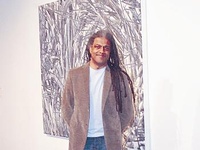Though Mitchell expresses concern that the Blair incident was used to condemn the hiring of African-Americans at newspapers, he says that at the Times, he is “incredibly well supported. My being a person of color has not been an issue. I was not an affirmative action hire.”
Mitchell says it was an issue for a handful of readers who called the Times to slam its decision to hire a black film critic.
“The only reason they knew I was black was because they saw me on television,” he says, bemused. “It wasn’t like I was leaving the g’s off of my action verbs and all of a sudden they could tell that I was a black guy. I guess racists also want to know where all the news that’s fit to print is coming from.”
As a widely respected and established African-American journalist, however, Mitchell is more than willing to be a role model. “I think the great thing about me being at the New York Times is that I set an example,” he says. “So people like me who are coming up who never thought they could have a job at The New York Times, that’s now something that that black people do.”
Even as African-American culture becomes a known commodity of the mainstream in music and fashion, Mitchell argues that films by and for African-Americans remain inhibited by financial obstacles. “We’re told that African-Americans only want to see movies where there’s gunplay,” he says. “There are also found wisdoms that a black film will only make so much money, so we can only release it in so many theaters, so we can only spend so much money to make it. And the great thing about a movie like Barbershop 2—at least in it being released in 2,700 theaters last week—is that it proved that that is not true.”
Despite recognizing this milestone, his Times review of the film was less than glowing, criticizing it as an overtly commercial, unfunny rehash of the original. But Mitchell maintains hope that black film will someday enjoy a renaissance from the underground.
“There’s still yet to be a black version of the art house circuit that serves essentially as being on the best triple-A minor league baseball team and being summoned up to the majors,” he says.
For now, there’s Barbershop 2 and countless other Hollywood vehicles of every stripe, which Mitchell has to watch in ever-growing numbers. It was widely speculated that Maslin, his predecessor at the Times, retired in part because of burnout from seeing too many shoddy films.
Whether or not this is true, Mitchell finds the idea laughable.
“Oh god, it’s so hard seeing bad movies!” he laughs. “My father worked two full time jobs until he retired. I see two bad movies in a day. What am I going to do?” He shakes his head. “The good movies make up for the bad movies.”
Sadly, he hasn’t reviewed any of the recent, stellar crop of Harvard-related films. “I didn’t realize this was a pattern,” he says, frowning. “I have to address my movie viewing vis-à-vis films about Harvard.”
He does want to know which is truer to life—Legally Blonde or Harvard Man—and when I pick the former, he considers it.
“So is there room for an innocent like me or Reese Witherspoon around here? That would be my question.”
—Staff writer Irin Carmon can be reached at carmon@fas.harvard.edu.









